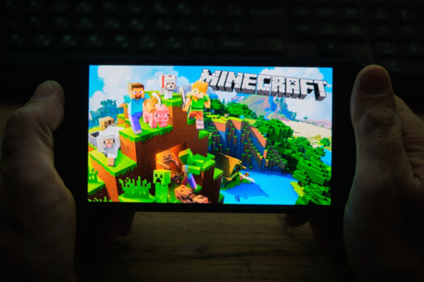
An image from the hugely popular computer game Minecraft | Graphic Adobe Stock
The international community is scrambling for ways to build global values and 21st-Century Skills. Gaming could be the answer
BY SRDJAN VERBIC
Today, we know that talent is distributed equally across the world, but opportunities to develop that talent are not. Children and young people still do not have equitable access to good schools, inspiring teachers or the tools they need to learn. Under-served by conventional education, a growing number of learners are looking elsewhere; to an online frontier where resources and learning software are widely – and often freely – available.
For children and young people, free learning games represent an important additional resource to supplement what they’re being taught in the classroom. Of course, for many in the world of education, these games and resources represent an unwelcome distraction and it’s clear that many of the products which are currently available are severely limited in their content and pedagogical value. But it’s also clear that electronic games are not going away. They are a fact of 21st Century life. And it’s long past time that policy-makers stopped thinking about gaming as a problem and started to consider how this $130 billion-a-year industry might become a driving force behind better education.
Simply put, today’s electronic games are no longer just about hammering down, down-forward, forward and click on a joypad. In many of today’s blockbuster games, empathy, co-operation and leadership are just as important as hand-eye coordination. Games are no longer just able to test your powers of logic and calculation; they can also examine your conscience. They represent an extraordinarily powerful platform both to impart and systematically test knowledge and skills.
There are, of course, already many games in existence which claim to improve learning outcomes, targeted at children and adults alike. But these traditional “learning games” tend to be heavily restricted by country context and national curricula (with the notable exception, perhaps, of foreign language-learning programmes). What’s missing are freely available games which are able to go beyond these borders to learning, and build the knowledge, skills and values which are universally required by children and young people across the world. But such games could exist – if they had enough support from creative educators and investors who recognize that their importance that goes far beyond short-term profit.
Games are no longer just able to test your powers of logic and calculation; they can also examine your conscience.
Today we accept, without question, that governments have a responsibility to provide our children with access to a free, quality education regardless of our own financial means or social background. But should this obligation not extend beyond the confines of the classroom? If we can make a reasonable case that learning games are an important tool to improve both equity in education and learning outcomes worldwide, then we might also reasonably assume that their development should not be left solely to the lottery of the stock market. I would say that we have reached the limits of what the free market can be reasonably expected to do on its own. It’s time to give things a nudge.
The international community should consider the creation of a pilot “innovation fund” to promote large-scale investment in learning games, drawing on contributions from leading international governmental organizations, development banks, aid-providing countries and major philanthropic groups. Such a fund could identify hundreds of innovative new ideas to bolster free access to quality learning around the world. It would also be a vital life-line to developers who may have an innovative idea for an effective learning game, but who cannot attract the funding needed to get it off the ground.
An international innovation fund could offer developers more than just financial backing; it could also provide them with expert support – and link them up with leading educators and researchers in education to create the most effective learning products. Such resources would help to direct developers and enable this fund to exceed the limitations of existing initiatives which are based only on venture capital investment.
What’s missing are freely available games which are able to go beyond these borders to learning, and build the knowledge, skills and values which are universally required by children and young people across the world.
I recognise that such an international fund would be a major undertaking, in a global landscape where existing aid to basic education is already badly underfunded. But such a mechanism would be a way for the international community to invest in our global future. Its existence could change both education and the gaming industry; foster universal civilizational values and improve the competencies of children and young people around the world. It could open a new global market for free learning games and – potentially – support the work of teachers around the world.
If the international community works together to support such innovation in education, the potential could be truly extraordinary. It’s not so far-fetched to image that learning games could one day be integral to how we collect global data on learning, or deliver international standardised testing. Imagine a world, for example, in which learners contribute to a future PISA test by solving complex problems through their gaming consoles, or by navigating scenarios in Virtual Reality.
It’s time for world leaders to think outside the box on education. With the global learning crisis, there is a growing recognition among policy-makers about the need to look beyond conventional solutions. But if they are prepared to consider what’s most readily accessible and relevant to children, then they might seriously consider the educational potential of this century’s most successful media.
The author is the former minister of education, science and technological development of Serbia, and a member of the Varkey Foundation’s Atlantis Group of former education ministers.

Comments